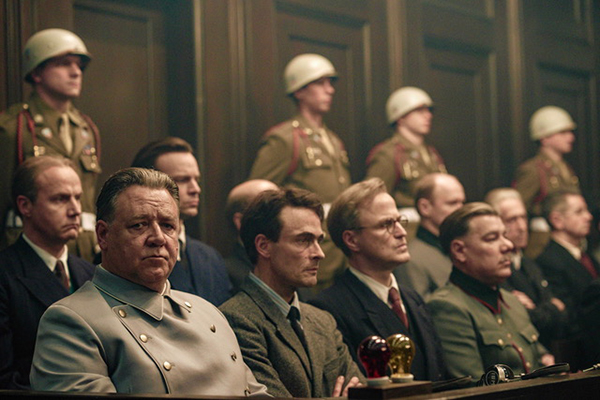MOVIE REVIEW: ‘Nuremberg’ offers history lesson that makes sense today

Russell Crowe, left, plays Nazi leader Hermann Göring in ‘Nuremberg,’ a film about the Nuremberg Trials at the end of World War II. Critic Dwight Brown writes that once you get past a slow-paced opening, the film offers a history lesson that is applicable to current times.
Courtesy photo
By Dwight Brown
Contributing Writer
The world needs to know what these men did. That’s the thesis that drives “Nuremberg,” which premiered at the Toronto International Film Festival in September and hits movie theaters Nov. 7.
The allies had defeated Germany and formed an international military tribunal to create the world’s first global trial, a reckoning that sought to hold the highest officers in the Nazi regime accountable for their atrocities. In mid 1945, Nuremberg, Germany became the site of the Nuremberg Trials. France, the Soviet Union, the United Kingdom and the United States collaborated.
Nazi party leaders like Hermann Göring were captured or surrendered and imprisoned while awaiting trial. The history is deep, the tribunal iconic and the outcome a lesson for all those who invaded other countries and committed heinous crimes against humanity.
Parallels to Nazi behavior are rampant around the world today. Dictators and wannabe dictators didn’t learn much from World War II, that fascistic period or the outcome of the trial. The timing couldn’t be better for a refresher course.
The source material for this history/drama/thriller is the 2013 nonfiction book “The Nazi and the Psychiatrist,” by Jack El-Hai. It’s a book that captures the real-life tête-à-tête between Göring and U.S. Army psychiatrist Dr. Douglas Kelley, who became frenemies.
Writer/director James Vanderbilt takes the reigns. His filmography is light as a filmmaker and more credible as a writer (“Zodiac,” “The Amazing Spider-Man”). Was assigning Vanderbilt director duties a gamble?
Opening sequences are heavy on the production elements. At first, the flashy cinematography, rich production design, brand-new clothes, pronounced art direction and pushy musical score are overwhelming,. like you are watching a made-for-TV-movie on steroids.
But if you disregard the glossy ornamentation, the heart of the story is a fight against an evil snake who pedaled hate, derision and intimidation and almost got away with it. Once Kelley meets Göring, intense psychological dynamics add nicely to the leadup to a courtroom drama of very high standards.
U.S. Supreme Court Justice Robert H. Jackson (played by Michael Shannon), gets the call. He’s been asked to be the lead prosecutor and assemble a team for a trial like no other. Göring (played by Russell Crowe) has been caught and sits in a cell — along with other Nazi relics. He’s impervious, emboldened and his opiate addiction adds to his steely demeanor.
To prosecute him, they have to get him to talk. He doesn’t or lies to appease. Only admitting that Germany was sending Jews to “work camps,” not “death camps.” That’s his alibi. Breaking him is the task.
Army psychiatrist Douglas Kelley (played by Rami Malek) is called in to analyze the infamous prisoner. To look for a crack in his façade.
Initially, the Nazi officer only speaks German, acting like he doesn’t understand English. Eventually that charade drops, and the two cautiously, skeptically talk to each other, looking for weaknesses. It’s an increasingly fascinating head game between a shrink and a mastermind.
Accusations are hurled and tension grows to the point of shouting matches.
“I am a prisoner because you won, and we lost. Not because you’re morally superior,” screams Göring.
As the trial comes, a conviction is not a certainty. All involved are determined but unsure as Göring, now on a worldwide stage, manipulates the courtroom to his benefit.
The footage has four elements that become stronger with each frame. The cat-and-mouse relationship between the two lead characters. The performances they give, which are matched by a stellar supporting cast. A ground-breaking event that became an archetype. And evidence of the heartless killing, discarding and incineration of Jewish people.
When the probing dialogue becomes outward hostility, the dynamics of the relationship between doctor and non-patient become fiery. This drama is so thick and self-contained it could be a fascinating Broadway play.
Crowe is blustery, imposing and vile. Malek has the more obvious character arc. It’s hard to appreciate his performance fully, until he lashes out at Göring in a pivotal, confrontational cell room scene where he blasts his adversary. It’s an Oscar-worthy moment.
Shannon is equally great as the judge turned stoic prosecutor. Leo Woodall, as Sgt. Howie Triest, commands his showy and emotional role as Kelley’s translator and conscience. Richard E. Grant, as Britain’s lead prosecutor, shines too.
The probable audience for this courtroom drama is older and likely only vaguely remembers its history. They, and others, may have forgotten the trial’s final outcome. Hence this project’s importance.
When the film blends in black and white vintage footage of piles of emaciated Jewish bodies being plowed away like snow, it’s shocking. A stunning visual that corroborates the horror of the Holocaust in ways that 1,000 courtroom recollections, accusations and denials could never do. The gravity of “The Final Solution,” what Göring is brushing aside, becomes blatant and indelible.
Sit through the first slow-paced, overproduced part and the reward for not giving up is a supreme history lesson, one that reminds us that those who do ungodly deeds today, can be held accountable tomorrow, forced to explain themselves and face justice. A soothing notion for these times.
Dwight Brown is the film critic for the National Newspaper Publishers Association’s News Wire.





